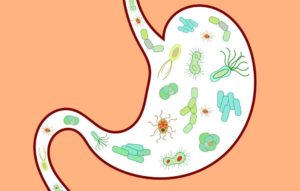Even if your stomach feels fine, it could be completely out of whack. We cannot see our inside BUT it would be such an awesome super power if we could. Like the inside of a cuckoo clock, our organs working away at keeping us functioning at optimal levels would be quite the sight to see!
Reflecting off of the article posted yesterday about prebiotics – the information below is from Prevention shared on Women’s Health that shines more light on the importance of a healthy gut.
1. You Catch Every Bug That’s Going Around
A whopping 70 percent of your immune system resides in your gut. The thin, sticky mucus that lines your GI tract is made up of immune cells, immunoglobulins (antibodies that attack bugs), and intestinal bacteria, explains Alpert. If you’re constantly getting sick, there’s a good chance that this system isn’t up to par. Her advice: Eat more fiber-rich fruit, veggies, and whole grains, and scale back on sugar. A healthy diet helps promote the growth of good bacteria in your gut (which feed on fiber) and limits the growth of harmful bacteria (which feed on proteins and fats, like red meat).
You can also talk to your doctor about taking an over-the-counter probiotic like Culturelle; it has the strain lactobacillus GG, which some studies suggest enhances immunity.
2. There’s an Itchy, Blistery Rash on Your Elbows and Knees
It may look like eczema, but it could be celiac disease, an autoimmune condition that makes you hypersensitive to gluten. Up to 25 percent of people with celiac disease present with this rash, known as dermatitis herpetiformis, and it’s not always accompanied by GI symptoms. “I’ve seen many patients who have been misdiagnosed for years by dermatologists, only to end up in my office after one of their physicians suspects celiac when they develop an issue like anemia or osteoporosis,” says Peter Green, M.D., medical director of the Celiac Disease Center at Columbia University in New York City.
What’s the connection? If you have celiac disease, ingesting even the minutest amount of gluten causes your body to release an antibody, IgA, which attacks the intestines. But sometimes IgA also collects in small blood vessels underneath the skin, leading to the eczema-like rash. The good news is that if you have the rash, your doctor can confirm a diagnosis of celiac by biopsying your skin and looking for specific antibodies. (Without the rash, you’d have to undergo an endoscopic biopsy.) Even better: Once you start a gluten-free diet, your rash should disappear.
3. Your Pearly Whites Are Looking Not-So-White and Pretty Raggedy
Has your dentist mentioned that the enamel on your teeth is completely worn down? See a GI specialist, pronto. This can be a sign of undiagnosed gastroesophageal reflux disease (GERD), or acid reflux, particularly if you have other subtle symptoms such as sore throat, wheezing, and/or coughing. “You can see characteristic dissolved areas on the cusp of the upper and lower molars, because the acid that comes up from your esophagus tends to dissolve the teeth at the back of your mouth,” explains Mark Wolff, D.D.S., Ph.D., professor and chair of the department of cardiology and comprehensive care at the New York University College of Dentistry. (When sugary foods erode enamel, the front teeth are the ones that usually get damaged.)
GERD can be diagnosed with tests such as x-rays or endoscopy (where your doctor inserts a thin tube with a camera and light down your throat); treatment may include losing weight, modifying your diet, and taking over-the-counter or prescription medication.
4. You’re Depressed
You’ve heard of comfort foods that make you feel better (at least temporarily), but it’s also possible that what you’ve been eating is making your mood lousy. That’s because certain types of bacteria in your gut can increase your risk of developing anxiety or depression, according to a 2015 study done at McMasters University in Canada.
When bad bacteria proliferate, they activate receptors in your GI tract that in turn cause the release of inflammatory substances called cytokines, explains Barry Sears, M.D., president of the nonprofit Inflammation Research Foundation and author of the bestselling book The Zone. These cytokines travel to your brain, where they disrupt neurotransmitters (such as mood-boosting serotonin, norepinephrine, and dopamine) and trigger a bout of depression.
You can help keep your gut and brain happy by eating plenty of foods rich in polyphenols, such as fruits, veggies, tea, and extra virgin olive oil. The “good” bacteria in your gut will use these molecules to fight off the “bad” bacteria that can foul up your mood, says Sears.
5. You’re Achy and Wiped
Some studies suggest that over 20 percent of people have small intestinal bacteria overgrowth (SIBO), which means abnormally high levels of bad bacteria are lurking in the small intestine. While SIBO often causes traditional GI issues such as bloating and diarrhea, sometimes it simply shows up as vague symptoms such as body aches or fatigue, notes Gina Sam, M.D., a gastroenterologist at Mount Sinai Medical Center in New York City.
Sam explains that too much bad bacteria can interfere with your body’s ability to break down and digest food, triggering vitamin and mineral deficiencies that zap your energy. If you’re bushed and can’t figure out why, see your doctor for blood tests to check for deficiencies. If SIBO seems likely, the next step is often a breath test, which looks at levels of hydrogen and methane in your blood. (High levels may indicate bacterial overgrowth.) A combo of antibiotics to kill bad bacteria and probiotics to build up good bacteria again may help you reclaim your zest.






